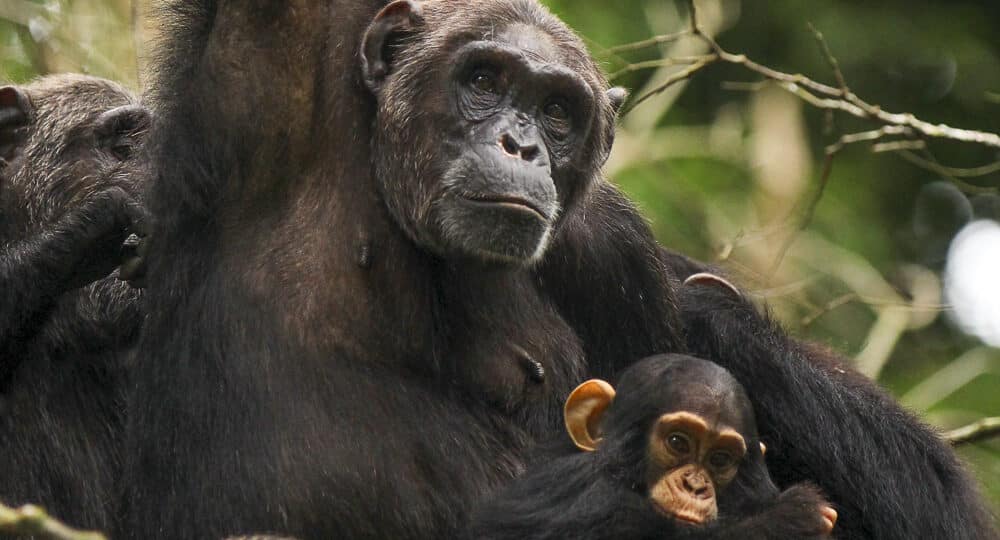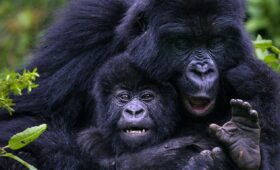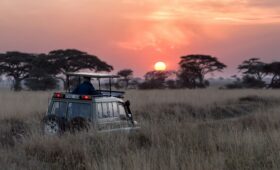Facts about Chimpanzee trekking in Kibale National Park
Kibale Forest National Park is one of the best safari destinations in Africa for chimpanzee trekking safaris and has the highest number and diversity of primates in East Africa. There are 13 species of primates including chimpanzees living within its 795km2 land cover with the most beautiful and most diversified tracts of tropical forest in the whole of Uganda.
Most popular safaris
3 day Uganda Gorilla Trekking Safari
5 Days Uganda Gorilla and Wildlife Safari
3 day Rwanda Gorilla tracking safari
3 day Gorilla habituation experience safari
3 Days Queen Elizabeth Safari (Luxury)
4 Days Ultimate Fly-in Gorilla Experience (Mid-Range)
3 Days Gorilla Trekking Safari To Bwindi (Luxury)
9 Days Ugandan Experience! Game, Chimps, and Gorillas (Luxury)
The most notable among Kibale National Park’s primate population is the surge of about 1,500 chimpanzees, divided into at least a dozen different communities, with more than fifteen (15) chimpanzee communities fully habituated to human presence. You need a Chimpanzee trekking permit before gaining access to Kibale National Park
Kibale National Park’s premier attraction is the Kanyanchu Primate Walk, offering the opportunity to seek out thirteen different primate species, with a variety of diurnal monkeys frequently observed. However, the true highlights of this walk are the chimpanzees. Since 1993, the Kanyanchu chimpanzees have been closely monitored, significantly increasing the likelihood of sightings.
This consistently popular primate walk allows visitors to observe chimpanzees in their natural habitat. The chimpanzee groups in Kanyanchu are well accustomed to human presence, with some having been observed for over 25 years, ensuring a sighting probability of over 90%.
How Much is Chimpanzee trekking in Kibale National Park?
There is an updated change in the price for Chimpanzee trekking permits in Uganda starting effective on 1st July 2024. Chimpanzee habituation is also offered at the Kibale National Park and the permit cost is slightly higher as compared to the normal chimpanzee trekking. Below is the updated cost of the chimpanzee permit in Kibale. Foreign non-residents $250, Foreign residents $200, East African Community citizens UGX 180, 000 and Chimpanzee habituation permit cost: Foreign non-residents $300, Foreign residents $250, East African Community citizens UGX 250, 000
How to book Chimpanzee trekking permits in Uganda?
Chimpanzee trekking permits in Uganda can either be booked from Uganda Wildlife Authority directly, you can contact the headquarters through emailing or telephone contacting. You can also select the day when you hope to do the Chimpanzee trekking in Kibale, at Trip care adventurers, we can help book the permits for you, provided you gives us the required details that is to say the date you hope to book. After contacting us, we will check for the chimpanzee permits availability and if there are available on your preferred dates, you will be requested to make a deposit as soon as possible to avoid last minute disappointments.
When to visit Kibale National Park
Although Kibale National Park is accessible throughout the year, the best time to Visit the park is during the dry season when the trails are dry and passable. This runs from December to February and then from June to September. The wettest area in Kibale National Park is the northern area, receiving an average annual rainfall of approximately 1700mm, mainly during March to May and September to November. The climate is usually pleasant with an average annual temperature range of 14C to 27C. The southern part of the park experiences the maximum temperatures and lower amounts of rains where the terrain drops onto the hot rift valley floor and forest provides way to open grassland.
How to get to the park?
By Road
The quickest route to Kibale National Park from Kampala city is through the Kampala-Fort Portal highway. The park can be reached over a fully-tarmacked road for a distance of 326 kilometres (approximately 6 hours). For tourists overnighting in Fort portal city, the park is only an hour’s drive away. There is also the alternative but longer option of going through Mbarara city with an optional stopover at Lake Mburo and Queen Elizabeth National Park.
By Air
Whereas there aren’t any direct flights into the park, tourists can either schedule or charter flights from Entebbe International Airport or Kajjansi Airstrip to Kasese Airstrip through one of the domestic carriers. The flight lasts about 1 hour. From here tourists will transfer by road for about 2 hours to the park headquarters. There is also the option of chartered flights to Fort Portal for 1 hour and 30 minutes.
Other Activities in Kibale National Park
Kibale Forest Hikes | Walking Trail
The Kibale Forest walk trail is 12km long and the hike is usually done in the dry season from the month of June to September are December to February, taking between 5 and 6 hours. Hiking Tours offer you an opportunity to discover the park’s assorted habitats such as river line forest, swamp, grassland and tropical rainforest.
Birding in Kibale National Park
The park is a home to 325 different bird species, including 6 that are native to the Albertine Rift area like the dusky crimsonwing, black-capped apalis, blue-headed sunbird, collared apalis, red-faced woodland warbler and purple-breasted sunbird. Other Kibale specials are the green breasted pitta, African pitta, black bee-eater, Abyssinian ground thrush, yellow spotted nicator, little greenbul, black-eared ground thrush, brown chested alethe, yellow rumped tinker bird, blue-breasted kingfisher, along with the crowned eagle.
The Bigodi nature walk offers the best birding safaris opportunities in the park as the swamp alone has approximately 138 bird species. It’s also famous for wildlife such as chimpanzees, red colobus, black and white colobus, red tailed monkey, bushbuck as well as mongoose.
Cultural Tours around Kibale
Led by a local guide, you will get a chance to meet the native Batooro people as well as the Bakiga immigrants (from the densely populated southwestern part of Uganda) who stay around this park. During the Kibale Cultural Tours you will visit a traditional village to see the traditional lifestyle of the Batooro, visit the local church, primary school, traditional healer and get a closer encounter with these natives. You will also enjoy some energetic traditional dances and songs by the Bakiga.
Crater Lakes Tour
The Kasenda area found in Fort Portal is home to more than 50 different crater lakes which are surrounded by steep sided volcanoes. a visit to this picturesque are will give you an opportunity to appreciate the unique landscape of this area.
Cultural Trails
The nature walk begins from Kanyanchu or Sebitoli and it takes about 2 to 6 days. The enroute will help discover the forest and late rest in the community-run campsites close to the villages of Kikoni, Nyakalongo and Nyaibanda.
Chimpanzee trekking rules and guidelines in Kibale National Park?
The age limit for chimpanzee safaris in Uganda is 15 years and beyond because children below this age may not withstand the conditions in the forest.
Eating or smoking 300 meters closer to the chimpanzees is forbidden to prevent chances of the chimpanzees grabbing it from you. They are wild animals that must search for their own food and not depend on human provision.
Don’t litter the forest while on the Chimpanzee trekking trail. You must keep your litter in your backpack in case you have it.
In case you wish to sneeze or cough, do it away from the chimpanzees and use your handkerchief or elbow.
Try not to talk loudly or make noise when going on a chimpanzee search because you may also scare the other forest dwellers that may be interesting to see.
Wearing a clean mask before meeting the chimpanzees is an added rule for all primate safaris after the Corona Virus Lockdown.
When you locate the mountain gorillas only one hour for chimpanzees trekking is allowed with them. This is to let the chimpanzees go about there day to day activities. They have been habituated to be in the presence of humans for just that time.
Keep a distance of about 7-8 meters from the chimpanzees when you locate them. This is to reduce the chances of passing an infection to the mountain gorillas.
Provoking the chimpanzees during the adventure is not accepted because you do not know how this will treat them. They are very sensitive to anything that happens to them.
Never miss a post, wherever you are!
Subscribe to our newsletter
Get the latest safari news and special offers delivered to your inbox.




